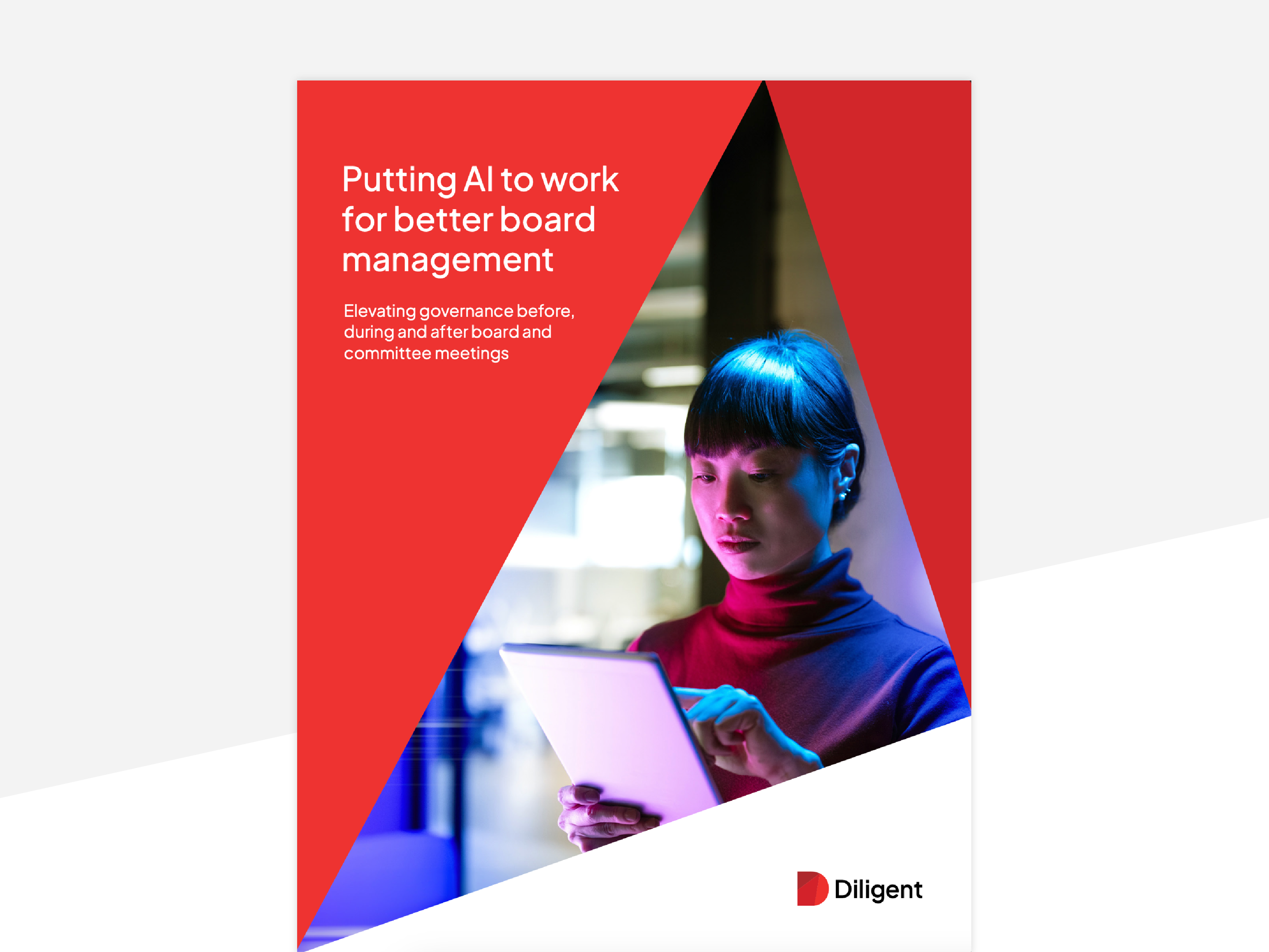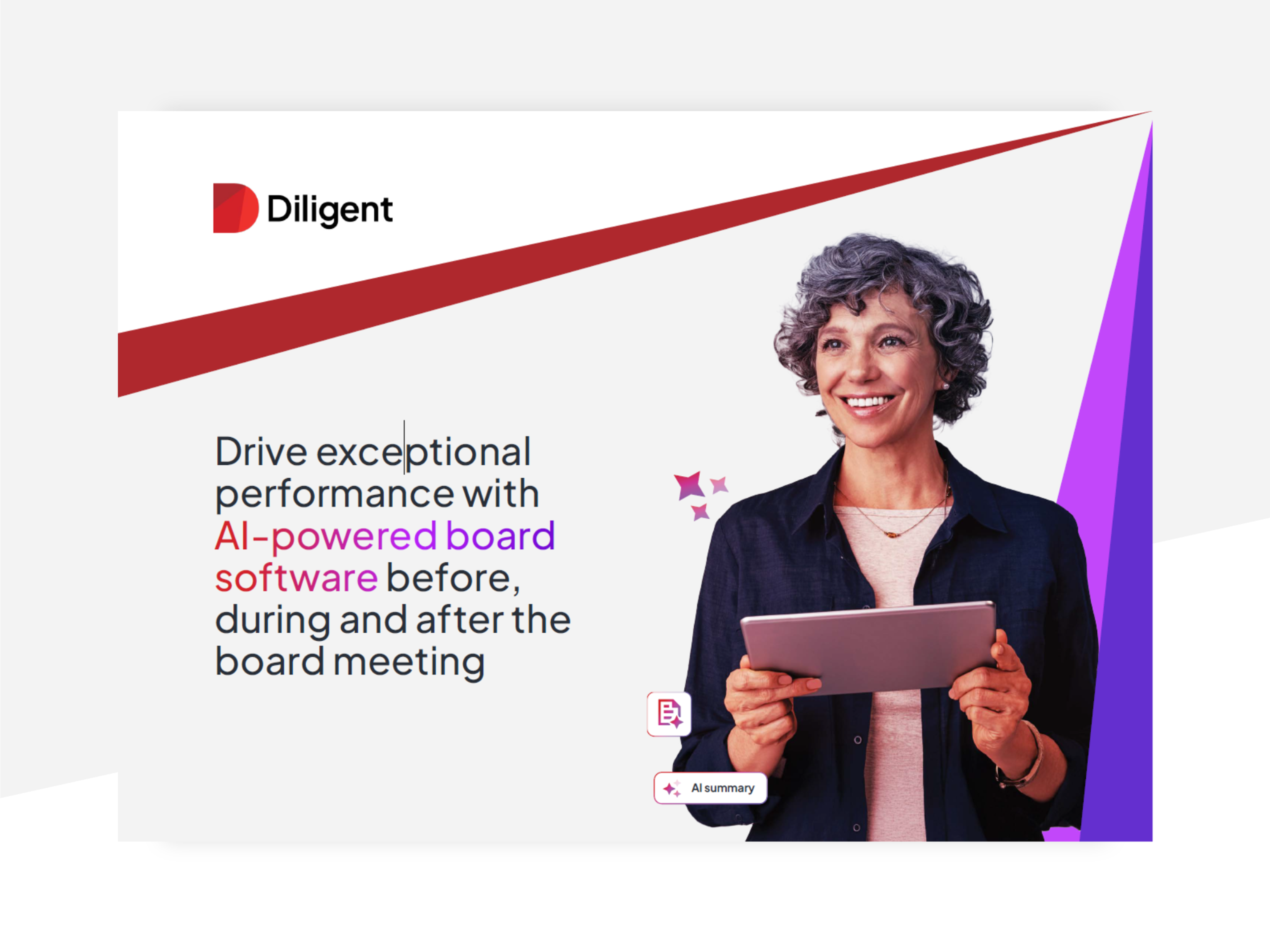Empowering governance professionals with AI: Practical guidance for adoption

As AI-powered governance tools enter the market, governance professionals are exploring key questions about when, how, and what to introduce to their organisation.
I was excited to be part of the conversation at our recent Breakfast Briefing, "Governance Transformed: AI’s Impact on Boards and Governance Leaders." Hearing from fellow governance professionals and experts including Dr Leanne Allen, Richard Anderson, Michael Charles Borrelli, and Paul Johnston, about AI in the boardroom was incredibly insightful. We discussed everything from demonstrating the ROI of AI tools to navigating the ethical considerations and the changing dynamics of reporting. Below are some actionable insights based on their discussions.
Discover more insights from the event on the risks and challenges associated with AI in the boardroom in this blog post.
The question of AI ROI
AI has huge potential to transform governance, but it is not emerging in isolation. In the current challenging business environment cost-reduction, efficiency and productivity are high priorities, especially in private equity or venture capital-backed businesses. Even though AI promises benefits in all these areas, ironically, uncertainties about short-term AI ROI can hinder adoption.
Start with visibly provable returns: AI-powered governance tools can save governance professionals considerable time in their day-to-day processes. Solution providers can advise on projected efficiencies and help to build a business case for adoption.
Choose simple metrics to show basic AI adoption: Dr Allen advises starting with a basic assessment of who is using permitted tools such as co-pilot or ChatGPT, asking them to estimate time saved and revisiting this question over time to obtain a baseline of adoption progression and related efficiencies.
Enhance board management with AI
Learn more about how AI is transforming corporate governance in our comprehensive guide.
Download the guideSelect metrics with caution
Today’s data-driven businesses tend towards the assumption of ‘the more metrics, the better’ on the basis that knowledge is power. But the sheer volume of data points available risk creating analysis paralysis. As Borelli put it:
— Michael Charles Borelli, Director, AI & Partners
Beware of deluging boards with data: It is important to establish metrics around AI implementation and ongoing use, but too much information in too great detail can be more hindrance than help.
Filter metrics below board level: Reporting on AI should be treated in the same way as all company information to be shared with the board; it should be filtered based on what the board is interested in, such as its impact on shareholder value, with only the essential data points being elevated to board level.
Be prepared for AI to change the structure and norms of governance
A core advantage of AI-powered governance tools is the increase in the transparency, quality, and integrity of data being communicated to the board. In the early stages, however, this may be a double-edged sword for director duties and liability and should be prepared for accordingly.
Prepare directors to rise to the challenge of AI literacy: In theory, the availability of vast amounts of real-time data means that, in future, directors could have ‘perfect knowledge’ of everything going on in the business. This means competence questions could be raised if directors didn’t spot something evidenced in the data and failed to act in the best interests of stakeholders as a result.
Johnston notes that ignorance is no defence, saying:
— Paul Johnston, Associate Director, One Advisory
Consequently, board directors must be prepared to build AI literacy – something that is prescribed in the EU AI Act. They must be willing to invest in understanding how AI works, its limitations and capabilities.
Appreciate the value of lived experience to avoid AI groupthink: On the other hand, boards and the businesses they serve must not become over-reliant on AI for decision-making. Human oversight is essential and critical to avoid the homogeneity – and ultimately AI-generated groupthink – that could arise if all entities are using similar AI tools. Experienced Non-Executive Director Anderson notes:
— Richard Anderson, Board Chair and NED
Anderson also points to the value of experienced directors who are alert to biases and are sufficiently distanced from the creation of the technology to be objective about its limitations and risks.
Seek to overcome reporting bias
Be prepared for reporting culture change: Advanced governance tools offer the potential to automate a lot of intelligence gathering and reporting to reduce inaccuracies and human error, increasing transparency and accuracy. This elevates the quality and diversity of data and increases assurance. However, it is also likely to change reporting dynamics across the different levels of the business, because current manual reporting leaves room for interpretation, as Dr Allen explains:
— Dr Leanne Allen, UK Head of AI, KPMG
AI tools could eliminate this manipulation – whether conscious or unconscious – but this may initially challenge existing preferences for human-led narrative reporting.
AI ethics advisor: A new role for CoSecs?
Explore the role of AI ethics advisor: As the AI era unfolds and regulation increases, the importance of ensuring AI is used ethically in the business and its boardroom will increase. The panel feels that governance professionals such as CoSecs can play a key role, as Johnston explains:
— Paul Johnston, Associate Director, One Advisory
With AI-powered governance and automation tools offering efficiency and productivity benefits, Johnston believes that there is an opportunity for CoSecs to step into the role of AI ethics advisor.
Consider establishing an AI ethics board: Many companies in heavily regulated industries, such as the financial sector, have already established AI ethics boards with the aim of reviewing and challenging AI use cases brought by the business. By ensuring this board has diverse membership and experience, use cases can be explored for ethical implications before they go ahead.
Final thoughts on AI in Governance
Acknowledging that now is a dynamic period in AI adoption, the panel shared some final thoughts.
Anderson advised that the biggest current opportunity for governance professionals lies in understanding the different conversations around AI that are going on around the business.
Borelli emphasised the importance of familiarisation with AI, counselling governance professionals to “remain curious”.
Leanne encouraged CoSecs to make a start using AI tools and to support their board in learning more about the topic, as take-up of AI-related education is currently too low.
Johnston underlined the importance of experimentation to understand what AI can and can’t do, and of starting conversations about its implementation.
Streamline your board meetings with AI: Discover how Diligent’s GovernAI tools can eliminate manual board meeting prep, boost productivity, and provide leaders with precise, decision-ready insights. Learn more here.
Keep exploring

AI for smarter board management
See how AI is transforming corporate governance. Learn how to automate tasks, enhance compliance and make data-driven board decisions. Download now.

Achieve exceptional board performance
Elevate your board's impact. Discover how AI-powered board management enhances meeting performance, collaboration & strategic decision-making.

Harnessing AI for more efficient and effective board pack preparation
Discover how AI transforms board pack preparation, enhancing efficiency and accuracy while empowering board directors to make better decisions, faster.
